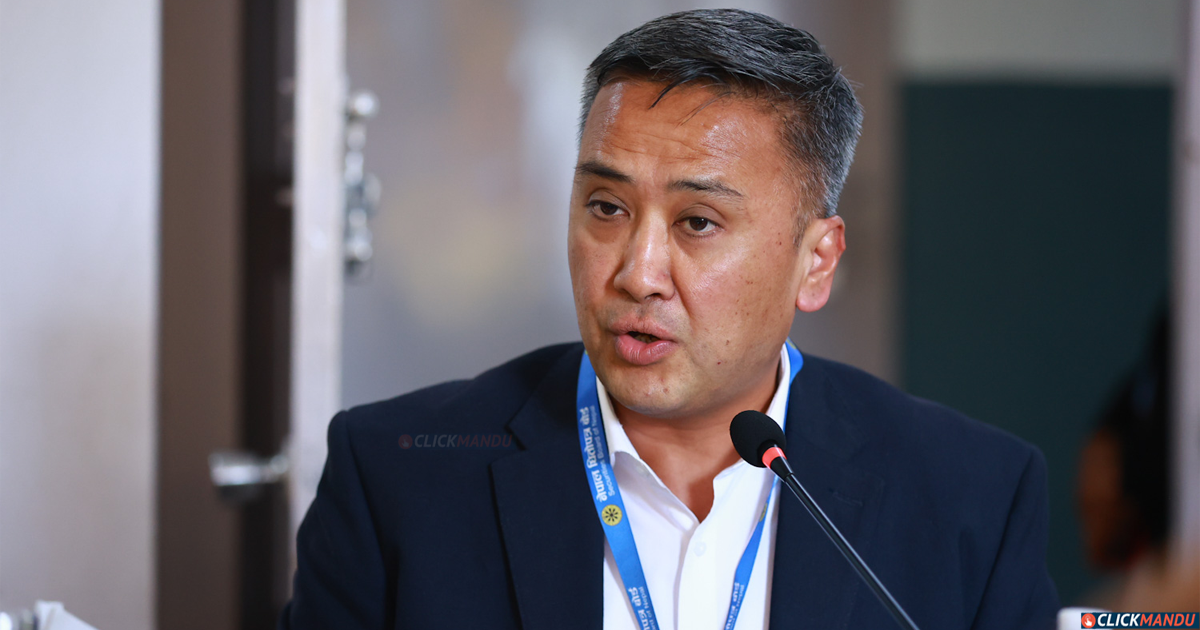Kathmandu: Chairman of the Securities Board of Nepal (SEBON), Santosh Narayan Shrestha, has said he feels unsafe due to his own employees.
On Thursday afternoon, he returned to the office for the first time since being locked inside his chamber by protesting staff members on Sunday. Shrestha stayed for about an hour before leaving.
The incident occurred as SEBON employees, who have been protesting for 24 days with various demands, locked the office doors during a board meeting last Sunday and kept the chairman and officials inside until around 10 pm. Police later escorted Shrestha and others out of the building in his own vehicle around 10:30 pm, took them briefly to a nearby station, and dropped them home at midnight.
Police had advised the chairman not to attend office for a few days, citing security concerns.
When Shrestha arrived at the SEBON headquarters in Khumaltar on Thursday, a union leader asked him to address all employees. However, Shrestha declined, saying he felt unsafe around them.
“When we requested the chairman to speak, he told us he felt threatened by his own staff and could neither address nor meet us collectively — nor fulfill our demands,” a union official told Clickmandu. “He left without staying even an hour. It seems he’s unable to face his own employees. This won’t help resolve the crisis.”
The incident has deepened mistrust and tension within the Board. According to a senior official, a tentative agreement had been reached last Friday to hold the board meeting on Sunday, but the situation spiraled out of control due to employee actions and external pressure from groups claiming to represent investors.
“We had reached a kind of understanding on Friday,” the official said. “But on Sunday, employees locked the meeting room, detained officials, and called in crowds from outside. This wasn’t a normal protest — it was an assault in nature.”
Employees reportedly demanded that SEBON either withdraw the Finance Ministry’s directive or file a legal challenge against it. They also refused to recognize a government committee formed to address the issue, further worsening internal relations.
The SEBON leadership maintains that it has done nothing improper and prefers dialogue and consensus-based solutions. “The country is in a fragile state and the anger among staff and external interference have pushed the institution into deeper crisis. Anarchy within the Board has crossed all limits,” a source said.
The standoff has widened the rift between management and employees, making the restoration of trust increasingly difficult.
The dispute began after the Finance Ministry issued a letter on 16 September 2025, instructing SEBON to implement a high-level (Revenue Secretary-level) decision that nullified two internal procedures — the Employee Welfare Fund Procedure (2014) and the Employee Protection Fund Procedure (2018).
The letter stated that these procedures were inconsistent with the Securities Act (2009), the Legislation Act (2024), the Government of Nepal (Allocation of Business) Rules (2017), and SEBON’s own Employee Service and Conditions Rules (2011). The ministry also ordered SEBON to recover all funds previously disbursed under these procedures as government dues and to seek prior approval for any future financial commitments.
In protest, SEBON employees halted all official work — effectively paralyzing the regulatory body. They argue that a secretary-level decision cannot overturn policies enacted by an autonomous regulator and called the move a “serious violation of SEBON’s institutional independence.”
Ajay Dhungana, President of the SEBON Employees Union, said the protest is not about personal benefits but about defending the regulator’s autonomy.
“The Securities Board has long faced undue pressure and interference from the government and the Finance Ministry,” Dhungana said. “This latest move to scrap the employee funds directly targets the staff. Our protest is a reaction to that.”
He added that discontent had been building for years due to repeated cuts in staff benefits. “The legality of the SEBON procedures should be determined by a judicial body, not through an administrative order,” Dhungana said. “The ministry’s unilateral decision is a direct encroachment on SEBON’s autonomy.”
Ashok Kumar Bishta, Assistant Director and Secretary of the SEBON Independent Employees Organization, echoed similar sentiments:
“We’re not protesting for salary or benefits — we’re fighting to protect the Board’s independence. If our demands are addressed, we’ll return to work immediately.”
Bishta said the leadership must take steps to restore a balanced working environment. He argued that the ministry’s retroactive decision to revoke benefits — some of which have been in place since 1996 — violates legal principles. “No law can be applied retroactively,” he said. “The ministry’s action is legally flawed.”
Former union president Raju Jisi said the Finance Ministry’s order effectively “ties the hands and feet” of employees. “It’s unacceptable to demand repayment of benefits that were lawfully provided over many years,” he said.
“According to the ministry’s decision, even retired employees and the families of deceased staff would have to return the money they received,” Jisi added. “Such retroactive enforcement is legally unsound and inhumane.”
The ongoing “pen-down strike” has halted SEBON’s operations for weeks. Employees gather for a one-hour sit-in each morning before boycotting all official work throughout the day.



Comment Here